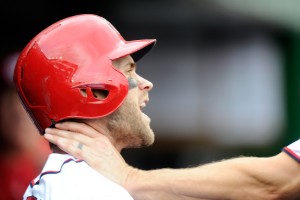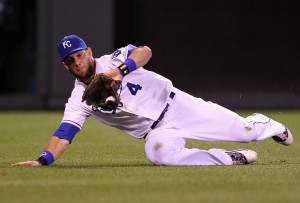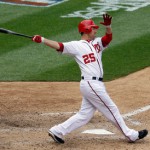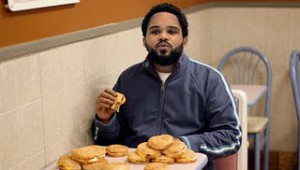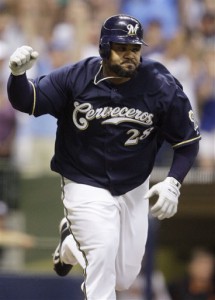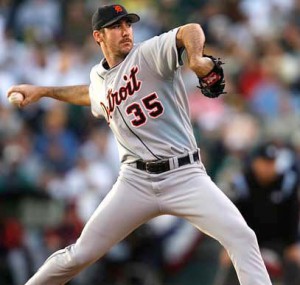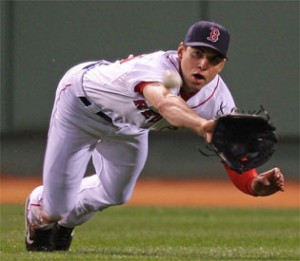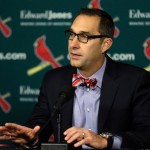
I’ll bet you don’t know who this is, but I think he’s baseball’s best GM. Photo AP via mail.com
I was listening to a baseball podcast this past week about General Managers in baseball and heard an interesting fact; it has now been more than two years since an MLB General Manager has been fired. Sure enough, the last GM fired was Houston’s Ed Wade in November of 2011. There is a GM with less service time (Rick Hahn of the White Sox), but he rose to take over the job for long time GM Kenny Williams, who was promoted to executive VP of the team. So all in all there’s been decent stability among baseball executives in the shorter term.
I’ve had a draft version of a “GM Rankings” post written for nearly three years. Why so long? Because I started the post, got distracted, and then no less than seven general manager positions were filled/replaced in two very hectic weeks following the end of the 2011 season. There’s no way you can judge how well a GM has done with just a few months on the job, so there was no point in trying to rank the GMs when a quarter of them were un-rankable.
Well, now we’re two plus years onwards from October 2011, each of those seven new GMs has had two seasons and three off-seasons to show their vision, and I think its time to revisit my rankings.
Below is an attempt to rank the GMs, #1 to #30. Beware: this is a massive post. 6,000+ words. I may have over-done it a little bit.
To me, a successful GM balances several factors all at once:
- Winning at the major league level (obviously).
- Total payroll outlay (in the context of free agency and use of your payroll budget)
- Player development/Farm system rankings
- Trades and industry opinion and reaction on moves made to build your team
Now for the caveats to keep in mind to the above GM goals:
- Purposely NOT winning on the field: In some cases you get carte blanche to purposely be awful on the field after years of mis-management and get a pass (see Houston Astros and the Chicago Cubs, along with several other teams to a lesser, less obvious extent).
- Payroll discrepancies/Major market GMs: To me, generating the best or 2nd best record in baseball with the largest payroll isn’t proving anything. In fact, if you do NOT make the playoffs despite such a massive payroll (as the Red Sox didn’t do in 2010 and the Yankees didn’t do in 2012), then if anything you’re really failing as a GM. So payroll versus success counts heavily to me. As you’ll see below with the rankings of the GMs from the profligate teams.
- Farm system usage caveats: In some cases you sacrifice your farm system to make acquisitions to help you win now (like what the Milwaukee Brewers did in 2011 and what Toronto has done for the last couple of years).
I created a GM rankings spreadsheet where I track all sorts of interesting information that you use to judge GMs (the link is also along the right hand side of the blog), and where I tried to quantitatively judge the 30 GMs. The spreadsheet has GM tenure, market size, ownership meddling factors, Farm system rankings, 2012 and 2013 payroll versus W/L rankings, plus my attempts to quantify three facets of a GM’s job: MLB success, Trades and FA moves and the Farm system. I will freely admit; i am paying significantly more attention to performance over the past three years than performance over the past 10. Maybe that’s fair, may be not. But it hurts a long-time GM like Brian Cashman who guided his team to the playoffs year after year (but, see Cashman’s write up for my reservations on GMs of massive payroll teams).
I’m classifying the GMs into rough tiers:
- The Elite: The best GMs in the game, who have balanced payroll, on-field success and development the best.
- The Excellent: a group of ten or so GMs who are all excellent at what they do and are mostly interchangeable up and down the order.
- The Middle-ground: a group of GMs that happens to include three of the biggest spender teams and the bottoming-out teams that are difficult to judge.
- The Concerning: GMs who for various reasons are struggling right now.
- The Underperforming: the bottom few GMs who for various reasons are easy targets for bloggers based on their moves and their teams.
It is really hard to rank these guys 1 to 30 without someone nit picking the order, but I would argue with you if you told me that some one in the bottom tier was actually “good.” It wasn’t as easy to do these rankings as I thought it would be; in fact every time I’ve come back to this post i’ve ended up moving around the GMs, to the point where I’m just declaring victory and publishing. I like the top and bottom of these rankings, but if you wanted to argue that the guy I’ve got ranked 22nd really should be 18th, then I probably won’t disagree.
Lets give it a shot:
The Elite
1. John Mozeliak, St. Louis. What more can you say about the model franchise of baseball and its leader/architect? The #1 farm system last year, a huge percentage of its players home-grown, in the playoffs three of the last four years, a win and a runner-up in that time, and all while maintaining a payroll outside the top 10 in the league. This team survived the FA loss of the game’s best player (Albert Pujols) by returning to the playoffs the subsequent year and leading the league in wins in 2013. Can’t ask for much more than that. Mozeliak is my choice for the best GM in the game over two other more famous candidates in the elite category.
2. Andrew Friedman, Tampa Bay. Is there any argument that Friedman is this high? He took over in 2005 and within three years had the league’s best record. They’ve won 90+ games four years in a row in the league’s best division. He’s done this despite routinely having one of the lowest payrolls in the game, despite off-loading talent as soon as it becomes pricey, by stockpiling draft picks (11 of the first 75 picks in the 2011 draft), and by signing his key players early on to incredibly club-friendly contracts (see the deals that Evan Longoria and David Price signed pre-arbitration). In fact, I daresay that the success the Rays have had in the draft was a driving force behind richer owners (hello, Mr. Jerry Reinsdorf) pushing for bonus limits on the amateur market. In 2013 the team had the 3rd lowest payroll in the game but still made the playoffs ahead of the Yankees (who spent nearly FOUR TIMES as much as the Rays). Many would say these facts by default put Friedman #1 and I wouldn’t argue; only the drop-off in his farm system this year keeps him from overtaking Mozeliak. Call these two GMs 1 and 1-a.
3. Billy Beane, Oakland. The league’s 2nd longest tenured GM is likely to retire as its longest, since he owns a stake in the team and has re-made his approach to building teams in the last couple of years to great success. This ownership stake affords Beane the job security that he wouldn’t have otherwise, and has afforded him the time he needed to find his next “market inefficiency.” After some lean years following the “Moneyball” period in the mid 2000s, Beane has turned the A’s into a two-time defending AL West defending champion (a division with two of the most profligate spending teams in the game). His new team-building method seems to be around wheeling-and-dealing, and he’s been good at it. He turned over a significant amount of his 2012 team and won even more games in 2013. The ding on Beane may be his farm system; Oakland has struggled to develop players lately and some may argue that Beane’s ranking should be slightly lower as a result. I’ll say this though; being successful in the league when routinely putting out payrolls in the $55M-$60M range (where his 2012 and 2013 teams sat) by default makes you one of the best in my book.
The Excellent
4. Jon Daniels, Texas Rangers. Texas made the 2010 World Series with the 27th highest payroll in the major leagues. That in and among itself is enough to earn Daniels his street cred. However, his 2013 payroll had ballooned to $125M and they got unlucky by missing out on the playoffs by one game in 2013. Otherwise two World Series trips in four years is still nothing to shake a stick at, and the fact that they didn’t win game 6 of the 2011 World Series still amazes me. Daniels’ reputation is on the line though in a big way; his moves for Prince Fielder, for Shin-Soo Choo and for Alex Rios will be tested in 2014. The team will need everything it can get out of its (mostly) home grown rotation thanks to unfortunate injuries already suffered this year (Derek Holland tripping over his own dog). I give Daniels a ton of credit for accomplishing what he did with a $65M payroll; can he continue to do it with a $130M payroll? The bar only gets higher.
5. Walt Jocketty, Cincinnati. I still wonder how he got fired in St. Louis. He made the playoffs 6 years out of 7, including a World Series win. Then the year following he gets canned. In Cincinnati, he inherited a reigning NL MVP Joey Votto but made some shrewd acquisitions (Mat Latos, Aroldis Chapman), and drafted well (including selecting Mike Leake, who has yet to spend a day in the minors). The Reds play in a small market but have made the playoffs 3 of the last 4 years and continue to develop good players (Billy Hamilton and Tony Cingrani being the latest two studs). Jocketty is in a lofty rank now; we’ll see how things go after the loss of Shin-Soo Choo this past off-season and the slight turning-over of the roster we’re now seeing. If the Reds continue to make the playoffs, Jocketty should continue to get a ton of credit.
6. Ben Cherington, Boston Red Sox. Normally I’m really skeptical of GMs for teams with $175M payrolls who have success. But it is difficult to argue with what Cherington has done since taking over the reigns. He completely undid a ton of the damage that his predecessor had done by offloading two horrible contracts (Carl Crawford and Adrian Gonzalez) and one malcontent (Josh Beckett) on the Dodgers and actually receiving prospect value back. He has quickly built the Boston farm system back to where it is one of the best in the game (they have as many top 100 prospects as any organization out there). And they just won the World Series. Cherington loses some credit for the disastrous Bobby Valentine hiring that led to the even more disastrous 2012 season … but he also recognized the faults with both the team and the manager and led a complete 180 degree turnaround. And I laughed at Cherington’s almost comical chasing of closers (as documented in this space in June 2013). But a title erases a lot of criticism. Boston remains well positioned going forward but will be depending very heavily on the fruits of their farm system in 2014 and beyond. If Boston turns these high value prospects into another playoff appearance while driving down payroll, Cherington’s ranking will only rise.
7. Mike Rizzo, Washington Nationals. Rizzo took over for the disgraced Jim Bowden in March of 2009 and had quite a job ahead of him. The team on the field was on their way towards losing 100 games for the second year in a row and the farm system was dead last in the majors. What has Rizzo done since? The team improved 30 games in the win column between 2010 and 2012, the farm system was considered the best in the game just two years on from Rizzo’s hiring (it should be said, thanks to two straight #1 overall picks resulting in two of the most dynamic players in the last 20 years being available to us), and now has two drafts and two off-seasons worth of work under his belt. He has brought a new mind-set to the draft, focusing on quick-to-the-majors college arms instead of nebulous tools-y high school players. He also has managed to work with the sport’s most notorious agent (Scott Boras) and successfully handled the two most high-profile draftees (arguably) in the history of the game. He has completely re-made the Nats roster in the past two years (only 3 members of the opening day roster 2009 team are still with the franchise). I’ve questioned his roster construction at times, feeling like he over-emphasized defenders at the expense of offense (running Michael Morse and Josh Willingham out of town), and he obsessed over a leadoff/CF type until he got one (Denard Span, trading away our best starting pitching prospect at the time), but a 98-win season smooths over a lot of criticism. Other pundits place Rizzo even higher than I have; 7th seems like a good spot to be until we see if this team can get back to the playoffs. If the Nats falter again in 2014 and don’t achieve something in this “window,” Rizzo’s tenure and the 2012 season may be viewed simply as an aberration instead of a well built team.
8. Frank Wren, Atlanta Braves. A couple years ago you would probably have Wren ranked in the middle of the pack at best. He clearly botched both ends of the Mark Teixeira deals, essentially turning Texas regulars Elvis Andrus, Neftali Feliz, Matt Harrison and catcher Jarrod Saltalamacchia into a year of Teixeira and Casey Kotchman. Imagine how good Atlanta would be right now if they still had the 3 core members that remain in Texas. That being said, you cannot argue with where the Braves have been going. With middle-of-the-road payrolls and an awful TV deal the Braves have a team with a lot of home-grown talent that won the NL East by 10 games last year. His rotation is young and home-grown (Minor, Beachy, Medlen, Teheran), his team full of home-grown talent (with Freeman, Heyward and Simmons leading the way). And they have the best bullpen in the game. On the down-side, there are questions about some of his recent signings (BJ Upton and Uggla in particular), the farm system hasn’t quite come back from its 2010 rankings (thanks to so much of the talent it generated), and I’m not sure anyone really likes Atlanta’s 2013 off-season. So, we’ll give Wren credit for the past few years and indicate a note of caution going forward.
9. Neil Huntington, Pittsburgh Pirates. I’m not sure if I’ve got him too high, but I’ll say this: after getting Pittsburgh to the playoffs (and a winning record) for the first time in a generation, Huntington has them in the right direction. His moves to build last year’s team were excellent, the team has a ton of home-grown talent yet still has one of the best farm systems in the game, and should continue to be a success in the NL Central.
10. Sandy Alderson, New York Mets. How can anyone involved with the New York Mets over the past 10 seasons be considered a success? Because long-time baseball insider Alderson has done well with what he was handed and has the Mets heading in the right direction. In the past three years their farm system has grown in leaps and bounds, going from the bottom third to nearly a top 5 system. He got great value in trade for R.A. Dickey, has drafted and developed well, and we started to see the fruits of that player development with last year’s all-star game starter Matt Harvey. He’s finally rid of the awful contracts that his predecessor handed him ($43.6M of the team’s $93M payroll last year was dead money to just two guys: Johan Santana and Jason Bay. Almost 50%) and has bought conservatively this off-season while Harvey recovers and more of his young arms matriculate. If the Mets ownership ever decides to start spending money again and this team’s prospects come to fruition, they could be a force.
11. Brian Sabean, San Francisco Giants. Sabean is the longest tenured GM in the game, is unabashedly “old school” and is consistently mocked for his signings and moves. I thought his Tim Lincecum deal was ridiculous, I couldn’t believe the amount of money they guaranteed Hunter Pence, and more than a few people are questioning the Michael Morse deal. San Francisco’s farm system is weak and has been for years (after contributing MVPs and Cy Young winners, it should be said). To all these naysayers I say this: Two World Series titles in the last four years. The goal of every team is to win the title, and his teams have done it twice in four years. The Yankees have one title in the last 15 years. So you have to give Sabean some credit. 11th seems about right. Not too high, not too low. He’d have been much higher had his team not imploded in 2013.
12. Chris Antonetti, Cleveland Indians. Antonelli has subscribed to the same “wheeling and dealing” mechanism for building teams that Billy Beane has done, and it turned a perennial doormat Indians team into a 2013 playoff team. They play in a small market and have an $80M payroll, and Antonelli has taken their farm system from awful to respectable in the last three years. So the system is improving as is the on-the-field product. So far, so good in Cleveland for Antonelli’s tenure. I’m hesitant to push him much higher because i’m convinced the Indians succeeded in 2013 on the backs of several very awful divisional rivals (for example; the Indians were 17-2 on the season versus the White Sox but only 4-15 versus the Tigers, quite a swing for a 90-win team; if they were that legitimate a team they would have been much closer to .500 against their divisional winner). So slightly above the median looks good.
The Middle-Ground
13. Jeff Luhnow, Houston Astros. Three years ago Houston was an 88-loss team with a $90M payroll and the 29th ranked farm system. To his credit, Luhnow has reversed at least two of those factors in a big way; he has cleared the decks of the awful contracts that boat-anchored the Astros under his predecessor. Of course, at the same time he’s turned the Astros into a 110-loss team and, for the first time since the dead-ball era, last place three years running. So what has Luhnow done? Inside of two years he’s gone from the worst farm system to the best on the backs of #1 overall picks Carlos Correa and Mark Appel. Soon they’ll likely add Carlos Rodon to that stable, giving this team a fearsome set of players to roll-out within a couple years. So how do we judge Luhnow? Right about in the middle; he’s set out to do what he needed to do; if his foundation leads to on-the-field success Luhnow will be counted among the best GMs in the game for laying out the roadmap and sticking to it.
14. Brian Cashman, New York Yankees. Some say that just the mere fact that Cashman has survived as long as he has in the shadow of the Steinbrenner family ownership of the Yankees should be proof enough that he is among the best GMs in the game, and certainly higher ranked than he is here. Fair enough. But here’s the inescapable facts: his farm system is deteriorating, the most significant player on the 2014 team actually developed at home seems to be Brett Gardner, they had a $225M payroll last year and didn’t make the playoffs, their rotation will pivot mostly on a 40-yr old’s career renaissance, and their starting 2014 infield played a combined 200 games last year. And they’re being saved only by the grace of Bud Selig‘s hatred for Alex Rodriguez, whose suspension “saves” the team $25M this year (quickly spent on their new “#3 starter” Masahiro Tanaka, to whom they guaranteed more than $175M dollars). I dunno; maybe Cashman should be lower. They have made the playoffs 4 of the last 6 years and have a title, and Cashman’s early tenure record speaks for itself .. but at what point do you notice that the team hasn’t done very much since the “core four” have entered their decline phases and begin to wonder if Cashman isn’t just a guy with a big checkbook instead of a good GM?
15. Dave Dombrowski, Detroit Tigers. Lots of on-field success thanks to Dombrowski sticking to his plan; he took over the year the Tigers lost 119 games. It is worth noting that 3 years later they were in the world series. Now he’s gotten them into the playoffs three years running, to which he’s due plenty of credit. But his farm system has hit rock bottom, he’s spending a ton of money, and he’s making very questionable moves. The industry panned his Doug Fister move (even if it seemed to greatly benefit the Nats) and people questioned his Prince Fielder for Ian Kinsler move. They were weird moves for a “win now” team. Perhaps I should give Dombrowski more credit, but his 2013-14 off-season knocked him down a number of pegs for me. If they miss out on the playoffs to an up-and-coming Royals team, he’ll suddenly be on the hot-seat.
16. Ned Colletti, Los Angeles Dodgers. Seriously, how do you judge the job Colletti is doing right now? His team’s payroll went from $95M in 2012 to more than $216M in 2013. He’s got $57M tied up in three outfielders not named Yasiel Puig right now. You almost got the impression that Colletti called up Boston and just said, “Hey, I’ll take every sh*tty contract off your hands right now … i’ve got money to spend and I don’t care how we spend it!” On the bright side, somehow the Dodgers have kept a reasonable ranking with their farm system throughout all of this, but the skill involved with paying everyone on your team $20M/year is close to nil. As with Cashman, I wonder if Colletti is ranked too high even here.
17. Dayton Moore, Kansas City Royals. Other mid-market teams (Oakland, Tampa, Pittsburgh) have shown a ton more accomplishment on the field than Kansas City; why hasn’t Moore’s teams done better? He’s been in his job nearly 8 seasons and the team spun its wheels for seven of them. Signings that didn’t pay off and fizzled farm system talents defined this team for years. Finally Moore went all-in, trading the best prospect in the game (Wil Myers) for a package of pitchers to help the Royals get over the hump. Between 2012 and 2013 they added $21M in payroll and these players and gained 14 games in the win column; just enough for … 3rd place. The industry entirely believes Moore was fleeced by Tampa Bay, and the trade looked so bad at the time that pundits wondered if Moore wasn’t getting some pressure from above to “win more now or get canned.” But it didn’t take Myers but the next season to win the rookie of the year award, and he may be a player that Kansas City fans rue for a generation. I think Moore may not be long for the job, and with good reason; why hasn’t he been able to win when guys like Huntington and Beane have?
18. Terry Ryan, Minnesota Twins. Ryan has been with Minnesota for-ever; hired in 1994. He stepped aside and then was re-hired in 2011, and is now in a rebuilding phase. The team let go one of its faces of the franchise last off season (Justin Morneau) and is going to begin a big youth movement this year. They’re going to be bad, but perhaps not Houston bad thanks to a couple of (odd?) starting pitcher signings. Help is coming; Ryan has built on of the best farm systems in the game and it features two of the top 5 prospects out there (Byron Buxton and Miguel Sano). Perhaps it isn’t fair to rank Ryan here with Luhnow higher, but Ryan was partly responsible for the downfall of this team and the abhorrent starting rotation of last year. But once their MVP-grade talents arrive at the majors, Ryan’s work of rebuilding the farm system should be rewarded.
The Concerning
19. Josh Byrnes, San Diego. Byrnes inherited a 90-win team that surprised but which was getting ready to hit a transitional stage. Byrnes got some good prospects from the Adrian Gonzalez deal and some more in the Mat Latos deal, but they havn’t turned into wins on the Three straight years of 71-76 wins has spirits dampened in San Diego. Now their MLB team looks poor, the farm system is good but drifting, and they’re talking about another rebuilding effort. He’s only a couple years in but things aren’t looking up; his division includes a team that is spending 4 times what he can spend.
20. Kevin Towers, Arizona. So here’s my summary of Towers’ tenure in Arizona so far: he continues to drive away players and prospects who aren’t “gritty” enough for him, trading them for 50 cents on the dollar. His farm system has gone from good to middle of the road. His payroll is rising … and yet his team is winning the same number of games. And yet both he and Kirk Gibson just got contract extensions. Why exactly does anyone think Towers and Gibson are doing a good job right now? How many more games would they have lost had they not magically found a 6-win player in Paul Goldschmidt (an 8th round pick) last year?
21. Jed Hoyer (Theo Epstein), Chicago Cubs. I know Hoyer is the GM, but lets be honest; this is Epstein’s team. The Cubs hired Epstein for him to re-make the franchise as he did in Boston. Except that Epstein left Boston in a huge mess, with a slew of very bad contracts and an even worse clubhouse. Now he’s come to Chicago and made some questionable moves (the Edwin Jackson signing, the Anthony Rizzo fan-boy pursuit, etc) while not making other more obvious moves (why is Jeff Samardzija still on this team if they’re “rebuilding?”). To their credit, they got value for Alfonso Soriano, only one of the most untradeable players in the game. And they’ve gotten a pass to rebuild the farm system, which is now ranked in the top 5 in the game and should start to bear fruit. Now, that farm system is loaded with hitters, and with Wrigley’s comfy stadium the Cubs may be offensive juggernauts in no time, but they still need pitching. How will the Hoyer/Epstein team handle that? Hopefully not with more signings like the Jackson deal.
22. Michael Hill, Miami Marlins. The one huge caveat that goes with the Miami GM job is this: Jeffrey Loria is probably the most hands on owner in the game, and you almost can’t judge this GM’s ability based on who is calling the shots. The only other owner who seems to have as much pull is, ironically, ranked next. Miami loaded up for 2012 in their new stadium and had completely dismantled things before August. Now they’re a $50M payroll team with some superstar prospects .. but a middling farm system and questionable direction.
23. Dan Duquette, Baltimore Orioles. Duquette has had an odd off-season; his owner 86’d two of his signings thanks to questioning the “medicals,” which insiders point out is Peter Angelos‘ method of nixing deals he doesn’t like. Must be frustrating. Instead Duquette is now signing every re-tread FA who can’t find a job thanks to the CBA’s draft pick compensation issues, punting draft pick after draft pick. The O’s did make the playoffs in 2012, thanks to an unsustainable record in one-run games, and have had a decent run of success out of their farm system (Manny Machado should be mentioned in the same breath as Trout and Harper frankly), but are they on the right track to get back?
24. Dan O’Dowd/Bill Geivett, Colorado Rockies. The Rockies have a very unique front-office structure right now, resulting from an August 2012 shake-up that left industry insiders questioning the roles and the message coming from the team. Nonetheless, the direction of the Rockies leaves something to be desired. They’ve drifted on the field, employed questionable starting pitching usage strategies, and generally are treading water. Their farm system is starting to look up though; will that be enough to compete in a division with the Dodgers?
25. Alex Anthopolous, Toronto Blue Jays. Anthopolous took over for the maligned JP Ricciardi after the 2009 season. In the time since, he traded Roy Halladay, acquired Morrow, traded for Escobar and Jo-Jo Reyes, acquired Rajai Davis, and perhaps most impressively offloaded the albatross contract for Vernon Wells. He had an 85-win team in the hardest division in baseball with a 70M payroll for 2011. Then he went for it, emptying the farm system (which was one of the league’s best in 2011) to acquire the likes of R.A. Dickey and the whole slew of ex-Marlins. Now he’s got a massive payroll, an underperforming team and empty cupboards in the minors. All the good work he did to prepare Toronto for battle in the AL east has gone for naught unless last year was just a big huge adjustment period for all these newly acquired veterans.
The Underperforming
26. Doug Melvin, Milwaukee Brewers: Melvin is an interesting case; the Brewers purposely bottomed out their farm system to make a playoff run in 2011, the last year before they lost Prince Fielder and their fortunes would change. And change they have; the Brewer’s player development efforts have not moved off the bottom of the league (their farm system is either last or dead last on every pundit list) while their on-the-field record has dropped (they’ve gone from 96 to 83 to 74 wins in the last three years). Now they’re the 4th best team in their division and it isn’t close, and it is unclear what their plan is going forward. They’ve got quality players at certain places, but have made odd signings (losing their 1st round pick last year to sign Kyle Lohse of all people). You can’t help the Ryan Braun situation, and they got unlucky with injuries (Corey Hart in particular) so perhaps this ranking is unfair. But I still feel like the Brewers are adrift in terms of strategy and thus Melvin’s ranked this low.
27. Jerry Dipoto, Los Angeles Angels. The worst or 2nd worst (along with Milwaukee) farm system in the majors for the past few years. One of the largest payrolls in the league giving them a 78-84 record last year. Over-paying for aging slugger (Albert Pujols) after aging slugger (Josh Hamilton) while inexplicably signing one of the worst statistical starters in the game to a multi-year deal (Joe Blanton) and entering last season with a clear and obvious rotation issue. Dipoto earned the absolute worst “quantitative grade” in my GM ranking xls, trying to measure the three GM factors of on-the-field success, farm system development and trades/FA signings. The only reason I don’t also rank him last is because i’m not entirely convinced that Dipoto isn’t a decent executive who’s being told by a highly-involved owner (Arte Moreno) to sign all these guys. But, there’s really no reason that a team playing in LA and who is spending three times what his divisional rival Oakland is spending isn’t consistently finishing ahead of them in the standings.
28. Rick Hahn (Kenny Williams), Chicago White Sox. What can you say? The White Sox lost 100 games with a $118M payroll last year and have had the worst (or near to it) farm system in the game for years. The White Sox organization is in a bad way, and i’m not sure why Williams’ stewardship was rewarded with the “promotion” to team president. They lost 18 games in the win column from 2012 to 2013 and it is hard to see how they’re going to be any better this year. It does seem though that they are undergoing a “rebuilding effort,” in that their payroll seems like it will be $40M less this year versus last and they’ve moved some of their bigger salaries in “rebuilding mode” moves (Alex Rios, Jake Peavy). So perhaps its slightly unfair to have Hahn so low, if he’s entering into a purposely bad period. Nonetheless; this set of executives got the White Sox where they are now, so their low ranking is earned.
29. Ruben Amaro, Philadelphia Phillies. I’ll admit that i’m probably biased here. While i’ve given credit to other GMs whose teams have had success in the past several years, i’ve not given Amaro the same benefit of the doubt. And that basically comes down to several, clear facts; Amaro has destroyed the Phillies with multiple long-term deals for declining players, most notably Ryan Howard‘s contract (widely considered the worst dollar for dollar contract in the game). His team 3rd highest payroll in 2013 and nearly lost 90 games. His recent FA moves have been laughable (Delmon Young and Michael Young? John Lannan as his sole pitching move last off-season? His ridiculous contract extension for Carlos Ruiz this past off-season?). His heels-in-the-ground obstinant refusal to adopt any understanding or acceptance for analytics or modern statistical approach to his job makes me wonder just how asleep at the wheel his owner is. He’s let his farm system lapse while his on-the-field product falters. He puts out mixed messages in regards to his direction (Cliff Lee mentioned in trade rumors? Are the Phillies going to rebuild or not?). But the coup-de-grace for me is the news that just came out that Amaro’s organization has purposely attempted to sabotage college kids who spurned the Phillies last summer, ratting them out to the NCAA out of pettiness, spite or vengeance. Despite their WS win and appearances in the last 6 years, I cannot for the life of me figure out why Amaro still has a job at this point.
30. Jack Zduriencik, Seattle Mariners. Zero playoff appearances in his tenure. His farm system has pushed out all the talent it apparently has to give and now is in the bottom third of the league with more than a few “busts” (notably Justin Smoak and Dustin Ackley vastly underperforming). A 90 loss team last year, and he’s just gotten done committing hundreds of millions of dollars in contracts yet likely has only improved his team a few wins, thanks to a fundamental lack of understanding of what it takes to build baseball lineups (he seems to be depending basically on 3 rookies in his rotation for 2014). And it seems that Zduriencik not only is poor at his job, but he may have depended on deception (if not outright fraud) to get it, thanks to the reporting of Geoff Baker at The Seattle Times last off-season. One only needs to look at his method of building teams to notice that he has no concept of defensive capabilities and he seems to collect 1b/DH types without consideration of how many runs they’ll be costing him thanks to sub-par defense (Michael Morse and Raul Ibanez at the corner OF positions last year, his plans to play Logan Morrison and Corey Hart in the OF this year). How long before Robinson Cano is a brooding $200M boat anchor on this team as they continue to lose 90 games year after year in a division dominated with better GMs and bigger payrolls? All these facts contribute to my ranking Zduriencik last.
Here’s some other links relevant to this discussion, for your perusal. Wiki’s list of all 30 GMs. Baseball America’s excellent Executive database. Scout.com’s Kiley McDaniel ranked the GMs by job security in Jan 2014. Buster Olney posted a “Peer Review” of GMs back in 2010, but its mostly obsolete with all the movement since. Still somewhat interesting to hear what GMs are saying about each other anonymously.
Finally some other rankings lists that I could find (and their top 5):
- Dan Szymborski‘s top 5 Dec 2013: Beane, Friedman, Daniels, Mozeliak, Rizzo (from a chat).
- MLBtraderumors ran a poll in April of 2013 where you can vote, and the top 5 crowd-source vote-getters are: Beane, Friedman, Mozeliak, Cashman and Sabean.
- The NYPost’s Ken Davidoff ranks GMS every off-season and he came in with Friedman, Beane, Daniels, Dombrowski and Mozeliak in Dec 2013 (he has Cashman way too high, but he is a NY-based writer and focuses on the entire body of work).
- Rantsports.com’s GM Power rankings from Aug 2013 (which I think are misguided mostly because of how low Beane is): Daniels, Cherington, Friedman, Huntington, Antonelli
- And lastly this oddly titled “Sexiest GMs” ranking from Dec 2012 caused some laughs at the time. Towers, Beane, Moore, Cashman, Hoyer.
Thoughts? Think I have some guys too high and some too low? Discuss in the comments.

